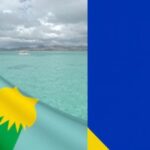Vanuatu Hosts Elections Amid Aftermath of Earthquake and Political Turmoil
Vanuatu is conducting a snap election amid the recovery from a devastating earthquake, which left multiple casualties and thousands displaced. Voters are seeking integrity and stability from their leaders, particularly in light of ongoing political instability and social issues that have emerged following the disaster. The youth express hope for governmental support to navigate the challenges brought on by climate change and past political failures.
Polls have opened in Vanuatu, a Pacific nation facing political instability while organizing a snap election in the wake of a devastating 7.3-magnitude earthquake that resulted in at least 14 fatalities and left many displaced. As Port Vila remained closed for business, residents formed lines in makeshift tents from the early morning hours to cast their votes. Students expressed their desire for leaders exhibiting integrity and stability during these challenging times.
Election officials and over 350 police officers worked to ensure a smooth voting process amid increasing crime and gender-based violence following the earthquake on December 17. Principal electoral officer Guilain Malessas acknowledged the difficulties and emphasized the importance of allowing people their right to vote. Polls will close at 4:30 PM and the new parliament must convene within 21 days of the election results.
Despite ongoing recovery efforts, there is a sense of hope among the youth for a government capable of uniting the nation. Laetitia Metsan, an environmental protection student, voiced the need for a stable government to address the challenges of climate change and disaster preparedness. In June 2024, Vanuatu held a referendum aimed at reforming political stability, yet continuity remains elusive, with rapid changes in leadership affecting governance.
Following the dissolution of parliament by President Nikenike Vurobaravu, many felt neglected during the earthquake recovery efforts. Marie Louise Milne, one of the youngest candidates and former deputy mayor, expressed concerns that the needs of the community were overlooked. She emphasized the necessity of prioritizing women’s healthcare and addressing violence against women in her campaign.
In Vanuatu, voting motives frequently stem from immediate needs rather than political ideologies, with many residents relying on their chiefs’ guidance. Voters also consider how candidates may improve local facilities. Noella Velvel articulated her desire for community enhancements, including solar streetlights and roof repairs, reflecting a general disappointment with past election outcomes.
Election campaigning continued vigorously until the deadline, with candidate convoys rallying support in Port Vila’s challenging terrain. Concerns arose regarding low voter turnout, previously dipping below 50%, compounded by hurricane displacement and a new voting system. Community education initiatives have been implemented, with residents expressing skepticism about past election promises.
Amidst these challenges, Ralph Regenvanu, an advocate for accountability and climate justice, is campaigning to address pressing public sector reform issues. His platform resonates with constituents, as many face unemployment and limited access to education, leading to a strong demand for effective governance.
Vanuatu has displayed a history of political instability characterized by frequent changes in leadership and government coalitions. The recent earthquake exacerbated these challenges, leaving communities vulnerable. A push for reforms was initiated in 2024 to enhance political stability and governance, yet the aftermath of the earthquake has revealed significant deficiencies in disaster response and recovery. The electorate is now seeking candidates who can address immediate social and economic issues as well as tackle long-term challenges such as climate change.
The elections in Vanuatu are taking place under extraordinary circumstances following a catastrophic earthquake, reflecting an urgent necessity for leadership that can provide stability and effective governance. Citizens, particularly the youth, are advocating for a government committed to addressing their pressing social needs and climate challenges. The outcome of these elections could significantly influence Vanuatu’s recovery and future resilience.
Original Source: www.theguardian.com








Post Comment